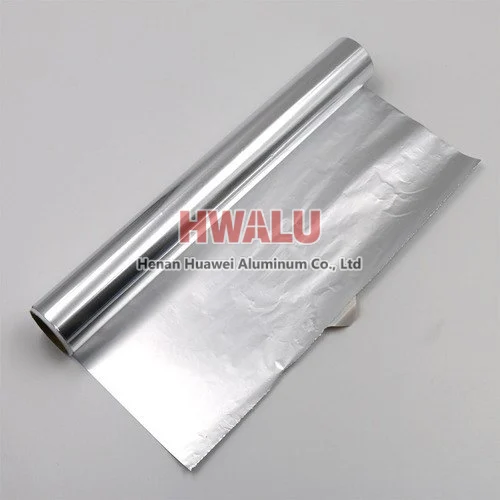In addition to cigarette packaging, the applications of aluminum foil in the packaging industry mainly include: aluminum-plastic composite bags, pharmaceutical aluminum foil blister packaging and chocolate packaging. Some high-end beers are also wrapped in aluminum foil on the bottle mouth. Medical packaging Medicinal blister packaging includes medicinal aluminum foil, PVC plastic rigid sheet, heat-sealing pain ...
What is aluminum foil for foil board Aluminum foil for foil board refers to a special type of aluminum foil used to make foil board, also known as "foil material". Foil sheets are commonly used to package food and pharmaceuticals to protect them from air, moisture, odours, light and other external elements. Aluminum foil for foil boards is usually thicker than regular aluminum foil, usually between 0.2-0.3 mm ...
Air conditioner aluminum foil Air-conditioning is indispensable to escape the heat in summer. As air-conditioning enters thousands of households, it is also constantly developing. At present, air conditioners are gradually developing in the direction of miniaturization, high efficiency, and long life. The air-conditioning heat exchange fins are also correspondingly developed in the direction of ultra-thin and hi ...
What is 13 micron aluminum foil? "Aluminum Foil 13 Micron" is a thin and light aluminum foil that falls within the thickness range of household aluminum foil and is commonly used for various packaging and insulation purposes. It is a very common thickness specification. 13 micron aluminum foil equivalent name 13μm aluminum foil 0.013mm aluminum foil Household packaging aluminum foil 13 micron aluminum foil ...
What is aluminum foil paper? Aluminum foil paper, often referred to as aluminum foil, is a type of aluminum alloy foil. Aluminum foil paper is usually rolled into a very thin, flexible and highly ductile material that can be used in a variety of scenarios such as packaging, cooking, construction and electrical insulation. Is aluminum foil paper aluminum? Yes, aluminum foil is made of aluminum metal. It is ...
1. Uncoated aluminum foil Uncoated aluminum foil refers to aluminum foil that has been rolled and annealed without any form of surface treatment. In my country 10 years ago, the aluminum foil used for air-conditioning heat exchangers in foreign countries about 15 years ago was all uncoated aluminum foil. Even at present, about 50% of the heat exchange fins used in foreign developed countries are still uncoated ...
ITEM SIZE (MM) ALLOY / TEMPER WEIGHT (KGS) ALUMINIUM FOIL, ID: 76MM, ROLL LENGTH: 12000 - 13000 meters 1 0.007*1270 1235 O 18000.00
In the production process of aluminum foil, there are multiple processes such as rolling, finishing, annealing, packaging, etc. The interlocking production process, any problem in any link may cause aluminum foil quality problems. The quality defects of the purchased aluminum foil products will not only affect the appearance, but also directly affect the quality of the products produced, and even more directly ca ...
The aluminum foil disposable lunch box has excellent oil and water resistance and is easy to recycle after being discarded. This kind of packaging can quickly reheat the food and keep the fresh taste of the food. 1. Performance of aluminum foil tableware and containers: All kinds of food lunch boxes produced by aluminum foil, aviation lunch boxes currently generally adopt the latest and most scientific alum ...
▌ Make bananas last longer Like avocados, bananas can go from underripe to overripe in the blink of an eye. This is because bananas release a gas called ethylene to ripen, and the stem is where the most ethylene is released. One way to prevent bananas from ripening too quickly is to wrap a small piece of aluminum foil around the stem. ▌ Polishing chrome with aluminum foil It can be used in places ...
Foil bags are not toxic. The inside of the aluminum foil insulation bag is a soft insulation material such as foam, which meets the food safety regulations. Aluminum foil has excellent barrier properties, good moisture resistance, and thermal insulation. Even if the heat reaches the middle PE airbag layer through the inner aluminum foil layer, heat convection will be formed in the middle layer, and it is not easy ...






